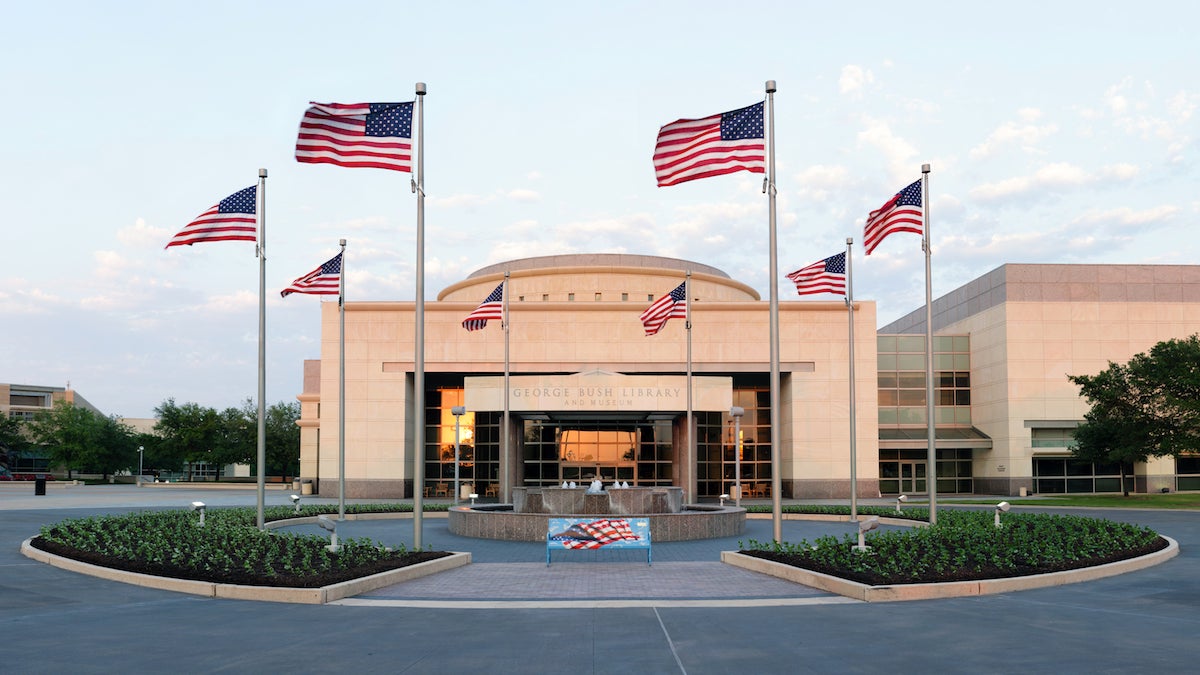Why does every president need a presidential library?
Listen Wikimedia Commons-Jujutacular ) " title="bush-library" width="1" height="1"/>
Wikimedia Commons-Jujutacular ) " title="bush-library" width="1" height="1"/>
George Bush Presidential Library at Texas A&M University. ( Wikimedia Commons-Jujutacular )
In 1971, two years after leaving the White House, Lyndon Johnson dedicated his sleek, windowless eight-story presidential library at the University of Texas. But on the pages of the Washington Post, cartoonist Herblock depicted Johnson as an Egyptian pharaoh opening “the Great Pyramid of Austin.”
That’s a perfect metaphor for presidential libraries, which memorialize our our leaders—and their often-monumental egos—in brick, cement, and stone. Like the ancients, presidents start planning these shrines before their rule comes to an end. So sometime early this year, President Obama will decree whether his own library will be located in Chicago, New York, or Hawaii.
And the competition for his affections is fierce. Newspapers recently reported that Obama’s library foundation was skeptical about a bid from the University of Chicago, because the university does not yet own the locations where it had proposed to place his library. So Chicago mayor and former Obama chief of staff Rahm Emanuel swung into action, assuring a press conference last month that the city would help the university acquire the land it needs.
But why should each president get his own library? Multiple presidential libraries are wasteful, costing taxpayers millions of dollars every year. And they’re undemocratic, because they allow our presidents—not the people who elect them—to define their history and legacy.
Presidential libraries aren’t mentioned in the Constitution or in any of our other founding documents. They started in 1938, when Franklin D. Roosevelt—midway through his second term of office– announced that he would personally construct a public archive in his native Hyde Park, New York.
Roosevelt was worried that the records of his administration—like many prior presidents’ papers—would be lost, destroyed, or sold to private bidders. He also wanted a space to write his memoirs and, most of all, to burnish his image as a defender of democracy.
So when Roosevelt opened his library in 1941, shortly after winning a third term, he contrasted American traditions of freedom to the looming threat of fascism. “This latest addition to the archives of America is dedicated at a moment when government of the people by themselves is being attacked everywhere,” declared FDR, who would declare war on Germany and Japan five months later.
In 1955, the Presidential Libraries Act converted Roosevelt’s precedent into law. Each succeeding president would raise funds for his own library, while the federal government would pay for its operation and upkeep.
But the act allowed the president to retain legal ownership of his papers, even as he deeded them to the government. That would change in the wake Richard Nixon’s 1974 resignation, when Nixon sought to retain control of secretly recorded conversations and other material from his scandal-tainted administration.
Congress responded by seizing Nixon’s papers, insisting that they were public rather than private property. And four years later, in 1978, the Presidential Records Act confirmed that the government retained “complete ownership, possession, and control” of all such materials.
But the presidents would continue to fund the libraries where the papers would be stored. That gave them the right to determine the sites of these facilities and—most of all—the stories that would be told in them.
So Bill Clinton’s presidential library in Little Rock, Arkansas gives only a brief nod to Monica Lewinsky and the sex scandal that nearly ended his presidency. And the recently opened George W. Bush Presidential Library near Dallas offers none-too-subtle defenses of Bush’s most controversial decisions, especially the invasion of Iraq and the “enhanced interrogation” of suspected terrorists.
All of this historical revisionism is subsidized by the taxpayers, of course. The annual operating expenses of our 13 presidential libraries is almost $100 million, which is hardly chump change.
But it pales next to the sums that the presidents themselves generate, which raise another set of concerns. George H. W. Bush received substantial library donations from foreign governments—including Saudi Arabia and Kuwait—as well as from the father of a man he had recently pardoned.
Most notoriously, Clinton issued an eleventh-hour pardon to fugitive commodities trader Marc Rich after Rich’s ex-wife donated $450,000 to Clinton’s library foundation. And we don’t know the full financial story of other presidential libraries, because the libraries aren’t required to disclose their contributors.
To its credit, President Obama’s library foundation is releasing the names of everyone who gives more than $200. The foundation has also declared that it will not accept donations from foreign nationals, which is a welcome step as well.
But it’s still worth asking whether the Chicago investment manager Michael J. Sacks—who also served as one of mayor Rahm Emanuel’s biggest campaign donors—expects to get something for his $250,000-to-$500,000 contribution to the Obama library. And, most of all, we should wonder why the president gets to have a separate library in the first place.
If all presidential records were located in one place—say, a Center for Presidential Research—we wouldn’t have to operate 13 of them. More Americans would be able to visit the facility. And, most of all, we would all participate in telling the story of our presidency. That’s how it should work, in a government of the people by themselves.
_________________________________________________
Jonathan Zimmerman is a professor of history and education at New York University. He is the author of “Too Hot to Handle: A Global History of Sex Education,” which will be published in March by Princeton University Press.
WHYY is your source for fact-based, in-depth journalism and information. As a nonprofit organization, we rely on financial support from readers like you. Please give today.

